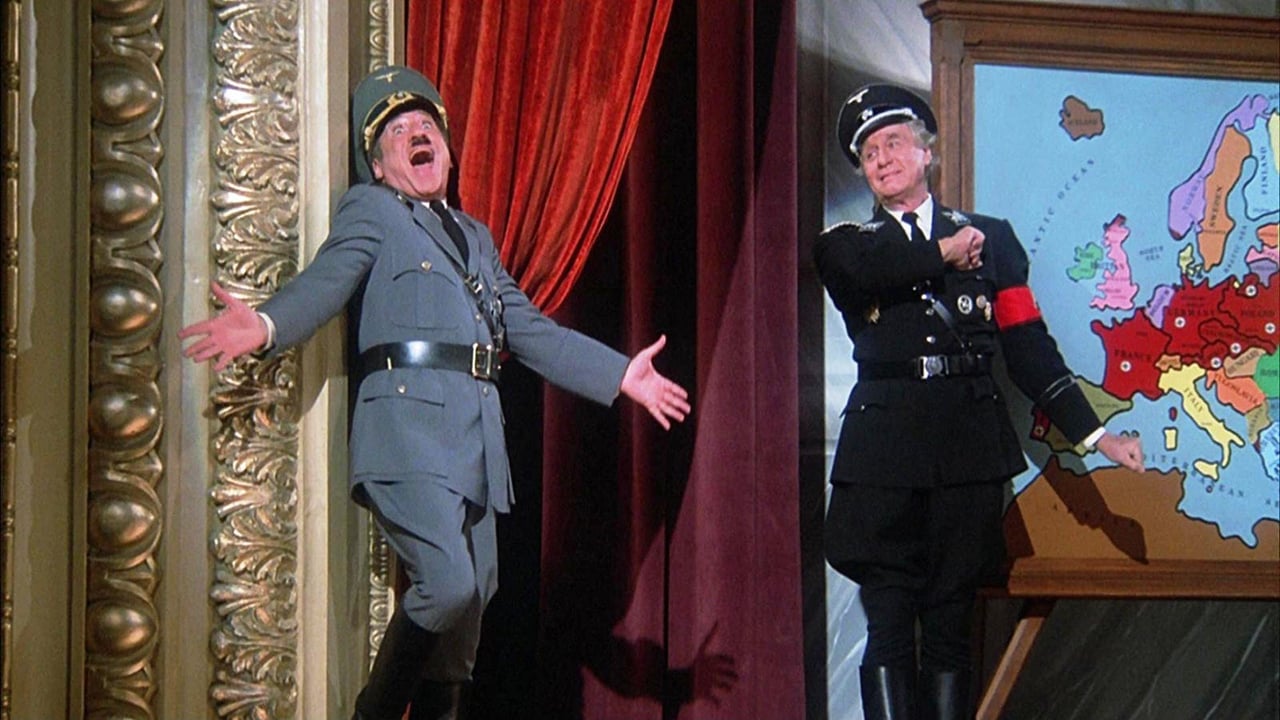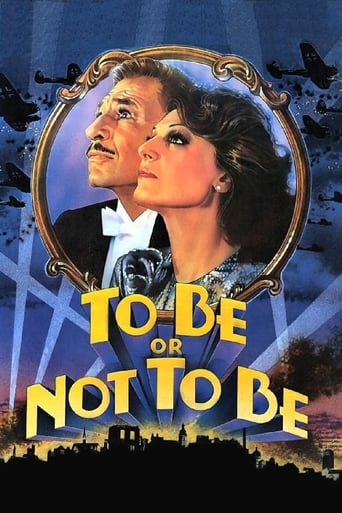FeistyUpper
If you don't like this, we can't be friends.
Ceticultsot
Beautiful, moving film.
Justin Easton
There are moments in this movie where the great movie it could've been peek out... They're fleeting, here, but they're worth savoring, and they happen often enough to make it worth your while.
Sabah Hensley
This is a dark and sometimes deeply uncomfortable drama
ShootingShark
Frederick and Anna Bronski are husband-and-wife actors running a theatre company in Warsaw in 1939 when Germany invades Poland. By chance, they discover that visiting Professor Siletski is a Nazi agent with a crucial report on the resistance, and resolve to use all their acting skills to stop him getting those names to the High Command.This remake of the 1942 Ernst Lubitsch comedy classic is very faithful to its predecessor but is a hugely entertaining picture in its own right. What I like about it most is its terrific cast - Brooks and Bancroft seem almost made for these roles and both are sensational, as are the whole Bronski troupe. Matheson and Ferrer are suitably suave and slimy, but the real stars for me are Durning and Lloyd as Colonel Erhardt and his adjutant Schultz - you can basically never go wrong with a short fat man and a tall thin man as a comedy duo, but these two are hilariously mismatched. The scene where Bronski, disguised as Siletski, delivers his report to Erhardt and the two Nazis scream at each other is a masterpiece of comic bungling. This film's chief addition is Sasha, the gay dresser character, who would never have gotten past the Hays Code, but exemplifies the many moments where Brooks cleverly sprinkles the comedy with sharp reminders of the horrors it's lampooning. It also has much more of a musical element courtesy of a terrific score by John Morris and some funny numbers (who else but Brooks would open with Sweet Georgia Brown in Polish ?). There aren't many straight remakes I'm especially fond of, but this is a definite exception; it's funny, beautifully made, re-tells a great story and is a terrific showcase for the comic talents of its ensemble. Produced by Brooks, and deftly scripted by Thomas Meehan and Ronny Graham (the latter of whom plays Sondheim, the very loud stage manager).
Lee Eisenberg
I know that this was a remake of a 1942 Ernst Lubitsch movie, but I've never seen the Lubitsch version. So, the Mel Brooks version of "To Be or Not to Be" is the one that I know. And I really like it. Just as he did in "The Producers", Mel makes the audience laugh hysterically at the Nazis (also accomplished by Charlie Chaplin and Roberto Benigni). Like many movies, it goes to show that humor really is the best way to deal with political issues...and also that Mel didn't have to be completely silly to come up with great ideas. Too bad that Mel Brooks and Anne Bancroft didn't co-star more often, as they were definitely a cool team here. You're sure to love it. And just remember what to do the next time that you have to deal with chronic invaders...Also starring Tim Matheson, Charles Durning, Christopher Lloyd and Estelle Reiner.
tedg
The older I get, and the more I am exposed to great ideas in film, especially comics in film, the less I tolerate Brooks.That's because he isn't a filmmaker. Never was. He's a vaudevillian, a stage comic. Now, that can be funny, and I suppose he's good at what he does. But there's a magic in cinema, in cinematic humor that bites deeper. Movies have a solvent when done right, a solvent that allows the humor to catalyze change.When you're on a stage, we expect the performer to be different, remote. We even laugh at the remoteness.Consider the film humor of embarrassment. We have a whole industry based on that, dozens of movies a year. They work because we enter the thing and feel embarrassed. That'll never happen with Brooks because he sees these as filmed stage shows.If you watch this, what you'll get is a rather clever acknowledgment of this. At root it is a simple structure: real world with Nazis, stage show with Nazis. (And of course, we chuckle, knowing Brooks' claim to fame is "Springtime for Hitler.") And as the thing goes on, we have the stage show and reality blurring from both ends.Brooks "plays" certain Nazi characters. And as time goes on the Nazis get more and more like stage characters. One device is rather sophisticated, where the real Nazi is made (by Brooks) to appear as a fake. And yes, Jews escaping as clowns from a pretend truck to a real one.At the center of all this is a valentine from Brooks to his wife. She's allowed to mug, and be the irresistible love interest to all heterosexual men, good and bad.If you go into this for laughs, you'll be disappointed. If you go into it as an essay on humor on the stage, you'll find it pretty darn impressive, worthy of the guy who introduced David Lynch to us through "Elephant Man."Ted's Evaluation -- 2 of 3: Has some interesting elements.
alexduncombe
having not seen the Ernst Lubistch original, I came into this film with a blank mind not comparing it to its predecessor. This for me, was a huge plus and I walked away knowing that it was one of the finest comedies I have ever seen. It followed the most basic rule of comedy, in that the plot was simple, yet interesting - meaning that you didn't have to spend time going over the plot in your head (something that can kill a comedy), yet you still maintain interest. Mel Brooks is on stunning form, combining personal depth with superb comedy. Anne Bancroft is strong, yet unforced in a role that seemed almost written for her, and the comic strength of the supporting cast helps add to what is a movie that you can just sit back and enjoy.

